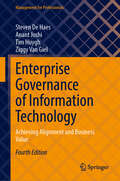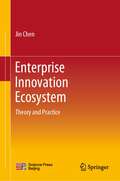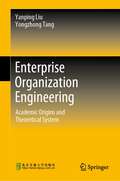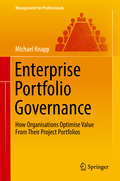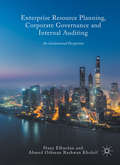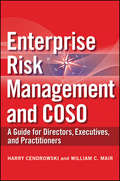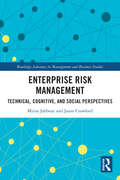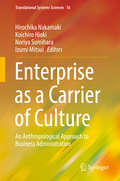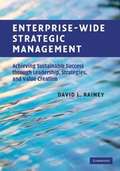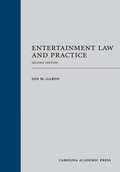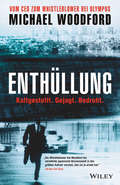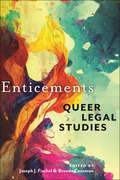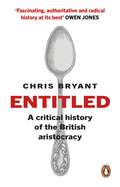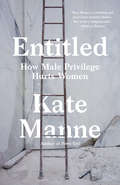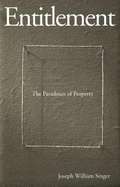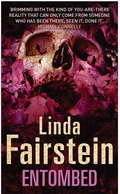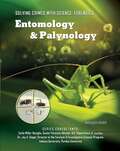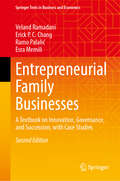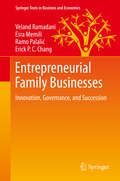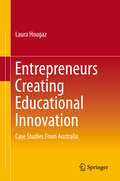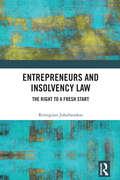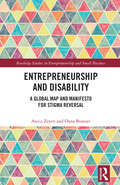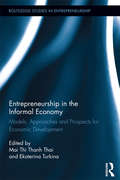- Table View
- List View
Enterprise Governance of Information Technology: Achieving Alignment and Business Value (Management for Professionals)
by Anant Joshi Tim Huygh Steven De Haes Ziggy Van GielThis book integrates theoretical advances and empirical data on enterprise governance of information technology (EGIT) with practical applications based on numerous case examples. In its fourth revised edition, this book provides practitioners and students with the most recent research advancements as well as a significantly reworked chapter on IT business value. The authors also include an in-depth discussion on control objectives for information and related technologies (COBIT) 2019 framework and an overview of complimentary methodologies such as Information Technology Infrastructure Library (ITIL) and ISO standards and SAFe. Furthermore, the existing chapters are supplemented by relevant theoretical perspectives that are foundational to understanding the enclosed concepts thoroughly. Featuring a variety of elements, including executive summaries and sidebars, extensive references, questions and activities and additional online materials, this book is a valuable updated resource for professionals, students and researchers alike.
Enterprise Innovation Ecosystem: Theory and Practice
by Jin ChenThis book targets the key issues of both research and practice in innovation and strategic management fields and is regarded as one of the important works explaining enterprises from the innovation system perspective. The book is based on the existing literature involving national innovation system, regional innovation system, and industrial/sectional innovation system and reviews intra-organizational innovation system researches and inter-organizational innovation ecosystem literature. Accordingly, the book proposes a “core competence-based innovation ecosystem framework”, indicating the importance of fit between firms' internal core competence and external innovation ecosystem, which is pivotal for leveraging the sustainable competitiveness advantages. In addition, the book further adopts multiple case studies, involving the firms' innovation ecosystems upon ten typical global enterprises in and out of China – e.g., Apple Inc., Siemens, Procter & Gamble, Microsoft Corporation, Google, Founder Group, Haier Group, China South Railway, Huawei, and Midea. Teachers and researchers from universities in innovation and strategic management fields and industrial management practitioners can benefit from the book.
Enterprise Organization Engineering: Academic Origins and Theoretical System
by Yanping Liu Yongzhong Tang"This book creates the concept of “enterprise organization engineering” by introducing the paradigm of tissue engineering in life science into enterprise organization research. It regards the enterprise as live organization, which has life characters and ability to grow and self-repair. The authors seek origins from seven theories including human tissue engineering, evolutionary economics, organization theories, enterprise theories, entrepreneur theory, human recourse theory, knowledge management theory, and summarizes the research framework including five parts : research on enterprise life characteristics, enterprise genes, enterprise seed cells, enterprise life scaffolds and research on enterprise growth factors. This research framework, which bases on five principles, presents a new perspective for corporate management staff and riches management theories."
Enterprise Portfolio Governance: How Organisations Optimise Value From Their Project Portfolios (Management for Professionals)
by Michael KnappThis book argues that the appropriate application of the principles and practices of corporate governance to organisational portfolio, program, and projects (‘3P’) governance brings about highly engaged, knowledgeable, and effective governance practices, which in turn substantially improves business case success.The book addresses all three layers of portfolio, program, and project within an integrated governance framework, and it answers the fundamental questions everyone involved in 3P governance must address:What governance structures (processes, functions, roles, responsibilities) need to be in place to ensure optimal portfolio investment outcomes?How do I know our portfolios, as structured, will deliver expected benefits and value?What should senior management be doing, acting in their portfolio governance roles, to deliver great portfolio outcomes?The book introduces and describes a number of important frameworks and models, designed not just for their practical application, but also to be easily comprehended by senior executives not comfortable with traditional ‘project speak’.
Enterprise Resource Planning, Corporate Governance and Internal Auditing
by Hany Elbardan Ahmed Othman Rashwan KholeifThis book investigates how corporate governance is directing the internal audit function (IAF) adaptation as a response to enterprise resource planning (ERP) systems. To date, there is insufficient knowledge about the adaptations of the IAF, which are required if it is to maintain its essential role as a governance mechanism. This book extends the reader's knowledge by exploring and theorising the adaptation of the IAF after ERP introduction and points towards future trends. Adopting an institutional approach, it analyses how the IAF responds to the external governance pressures and the internal pressures of the control logic following the introduction of an ERP system. Featuring data from two listed companies in the food and beverage sector and two large banks operating in Egypt, this volume will be of interest to researchers and academics in the field of financing and ERP systems in particular.
Enterprise Risk Management and COSO
by Harry Cendrowski William C. MairPraise for Enterprise Risk Management and COSO: A Guide for Directors, Executives, and Practitioners"Enterprise Risk Management and COSO is a comprehensive reference book that presents core management of risk tools in a helpful and organizedway. If you are an internal auditor who is interested in risk management, exploring this book is one of the best ways to gain an understanding of enterprise risk management issues."--Naly de Carvalho, FSA Times"This book represents a unique guide on how to manage many of the critical components that constitute an organization's corporate defense program."--Sean Lyons, Corporate Defense Management (CDM) professional"This book provides a comprehensive analysis of enterprise risk management and is invaluable to anyone working in the risk management arena. It provides excellent information regarding the COSO framework, control components, control environment, and quantitative risk assessment methodologies. It is a great piece of work."--J. Richard Claywell, CPA, ABV, CVA, CM&AA, CFFA, CFD"As digital information continues its exponential growth and more systems become interconnected, the demand and need for proper risk management will continue to increase. I found the book to be very informative, eye-opening, and very pragmatic with an approach to risk management that will not only add value to all boards who are maturing and growing this capability, but also will provide them with competitive advantage in this important area of focus."--David Olivencia, President, Hispanic IT Executive CouncilOptimally manage your company's risks, even in the worst of economic conditions.There has never been a stronger need for sound risk management than now. Today's organizations are expected to manage a variety of risks that were unthinkable a decade ago. Insightful and compelling, Enterprise Risk Management and COSO reveals how to:Successfully incorporate enterprise risk management into your organization's cultureFoster an environment that rewards open discussion of risks rather than concealment of themQuantitatively model risks and effectiveness of internal controlsBest discern where risk management resources should be dedicated to minimize occurrence of risk-based eventsTest predictive models through empirical data
Enterprise Risk Management: Technical, Cognitive, and Social Perspectives (Routledge Advances in Management and Business Studies)
by Jason Crawford Mirna JabbourERM is considered a dynamic capability that is critical to companies’ success from strategic and performance perspectives and is increasingly implemented in response to growing pressure from external stakeholders to enact and add legitimacy to existing management control systems. However, implementing ERM is a challenging process where success is dependent on balancing technical and social factors. This book explores the challenges of implementing ERM from technical, cognitive, and social perspectives to enhance the organisation’s capacity to generate and integrate information and knowledge about risk and uncertainty.In existing publications, ERM implementation is mainly viewed from technical or educational perspectives and treated as formal, technical, linear processes. This book takes a different stance by recognising that implementation depends on formal and informal mechanisms that require a balanced combination of technical and social approaches. It changes the paradigm to demonstrate that the implementation of ERM is not a linear process that is similar across industries and organisations, but relies on multiple dependencies such as leadership, corporate governance, and the culture of the organisation.This book will be a valuable resource for scholars, as well as upper-level students, across disciplines related to risk management, including accounting and finance, business and management, leadership, and organisational studies.
Enterprise as a Carrier of Culture: An Anthropological Approach to Business Administration (Translational Systems Sciences #16)
by Hirochika Nakamaki Koichiro Hioki Izumi Mitsui Noriya SumiharaThis book expands anthropological studies of business enterprise to include comparative and interdisciplinary perspectives. A number of books on business anthropology have been published, but most of them are written by anthropologists alone. By contrast, this book engages interdisciplinary studies, e.g., not only by anthropologists but also management scholars and other social scientists. It is the second volume of studies forwarding anthropological approaches to business administration, Keiei Jinruigaku. This volume focusses on the cultural dimensions of enterprise. Here enterprise is viewed as a medium carrying culture, rather than solely an entity of production and management, as is typical in mainstream studies. The approach is based on Tadao Umesao’s definition of culture as a projection of instruments/devices and institutions into the mental/spiritual dimensions of life. Therefore, in our view production and management are among the projections of the cultural aspects of enterprise. This perspective, we believe, constitutes a new frontier in the study of business administration. This book consists of three parts, the first being “religiosity and spirituality”, the second “exhibitions, performance and inducement,” and the third “history and story.” In Part I, Quaker Codes, ex-votos, and spiritual leadership are discussed in relation to management and behavior, and miracles and pilgrimage. Part II describes exhibitions justifying nuclear power industry within power plants in both Japan and England, the exhibition by English families of their porcelain collections, and the performance skills of orchestral maestros. All of these examples indicate that, through the use of narratives and myths, exhibits and performances overtly and covertly induce visitors or audiences to certain viewpoints and emotions. Part III offers examples of histories and stories of enterprise articulated through the branding and consumption of industrial products, and their display in enterprise museums where the essence of culture and heritage is cherished and emphasized, by and for the wider community and the enterprise itself. Conjoined as an interdisciplinary team of Western and Japanese researchers, we apply an anthropological approach to the cultural history of enterprise in both Britain and Japan.
Enterprise-Wide Strategic Management
by David L. RaineyIn today's highly competitive and dynamic business environments, corporations can no longer afford to rely on the static strategic management constructs of the past. Enterprise-wide Strategic Management is a leading-edge work that shows how business leaders can take better advantage of their opportunities by taking a broader perspective of the world in which they operate. David Rainey advocates a holistic approach to the business environment, arguing that managers must work with all stakeholders, both internal and external, to create long-term success. Including numerous case studies featuring global corporations and small- and medium-sized enterprises (SMEs), the book provides guidance and support in formulating, developing, and implementing business strategies and action plans. It also includes advice on how to develop and deploy strategic management systems, management constructs, and organizational structures. This gives executives, strategic leaders, professionals, and practitioners the tools they need to create value and achieve sustainable success.
Entertainment Law and Practice (2nd Edition)
by Jon M. GaronThis casebook provides a comprehensive survey of the primary entertainment law practice areas, including motion pictures, music, social media, television, and cultural arts. It addresses both the practical aspects of entertainment and the fundamental underpinnings of entertainment law. Built on a solid theoretical basis for each topic, the materials integrate problems and examples of the cutting edge issues transforming entertainment and technology law practice. This casebook is uniquely balanced to address and integrate the need to teach the practitioner's issues with the jurisprudential framework necessary to make the course appropriate to the law school curriculum.
Entgrenzte Verantwortung: Zur Reichweite und Regulierung von Verantwortung in Wirtschaft, Medien, Technik und Umwelt
by Anja Seibert-FohrDieses Buch bietet eine interdisziplinäre Auseinandersetzung mit dem Begriff der Verantwortung in einer zunehmend von Entgrenzung geprägten Lebenswelt. Es beschreibt, wie durch den technischen Fortschritt und den Wegfall von Grenzen im Bereich digitaler Kommunikation, globaler Wirtschafts- und Finanzmärkte sowie in Forschung und Umwelt neue Herausforderungen für die Regulierung von Verantwortung entstanden sind. Die Autoren sind namhafte Wissenschaftlerinnen und Wissenschaftler unterschiedlicher Fachdisziplinen einschließlich der Philosophie, Theologie, Soziologie, Sozialpsychologie, Sozialanthropologie, Poltischen Wissenschaft, Ökonomie und der Rechtswissenschaften. Sie beschreiben die ideengeschichtliche Entwicklung des Verantwortungsbegriffs und weisen auf aktuelle Regulierungs- und Normbefolgungsdefizite hin. Zu diesem Zwecke zeigen sie auf, worin die Entgrenzung unserer Lebenswelt konkret besteht, welche neuen Herausforderungen dadurch entstanden sind, welche Bedeutung diese Entgrenzung für die Regulierung, sprich die Verteilung und Zuschreibung von Verantwortung, hat und wie Verantwortung vor diesem Hintergrund neu konzipiert werden kann. Ein besonderes Augenmerk gilt dabei dem Umgang mit Neuen Medien, Big Data, Künstlicher Intelligenz sowie Cybersicherheit. Auch der Ausfall von Verantwortung im Dieselskandal wird untersucht. Auf dieser Grundlage werden Anregungen für eine Neubestimmung der Reichweite und Grenzen von Verantwortung erarbeitet. Neue Formen der Regulierung werden schließlich am Beispiel des Klimaschutzes dargestellt und bewertet.
Enthüllung: Vom CEO zum Whistleblower bei Olympus
by Michael Woodford Andreas Schieberle Marlies FerberEin Mann allein gegen einen gigantischen japanischen Konzern! Ein heldenhafter Kampf gegen Betrug und Vertuschung! Mut, Ehrlichkeit und Integrität, die ihresgleichen suchen! Das ist die Geschichte von Enthüllung und Michael Woodford. »Ein meisterhaft fesselndes Buch, in dessen Mittelpunkt ein wunderbarer Held steht. Mit allen Attributen eines John-Grisham-Romans ... Aber Enthüllung ist weit furchterregender, weil alles wahr ist.« Evening Standard »Bemerkenswert. Lebendig, zornig und aus vollem Herzen.« Mail on Sunday »Woodford erzählt in einem an Grisham erinnernden Tempo, wie er auf Betrügereien im Umfang von 1,7 Milliarden Dollar stieß, die er, anders als seine Vorstandskollegen, nicht bereit war zu vertuschen. Er ist einer der wenigen ausländischen Manager, die bis tief hinein in ein japanisches Unternehmen vorstießen und unerschrocken davon berichten.« Financial Times »Der Ex-Manager Woodford ist auf dem besten Weg, ein Bestsellerautor zu werden. Sein Buch hat alles, was ein guter Wirtschaftskrimi braucht!« Die Welt »Michael Woodford machte Bilanztricks bei Olympus öffentlich und brachte einen der größten Skandale der jüngeren Wirtschaftsgeschichte ins Rollen. Spiegel-online
Enticements: Queer Legal Studies (LGBTQ Politics)
by Joseph J. Fischel and Brenda CossmanProvides a variety of queer, interdisciplinary interventions upon the social and legal regulation of sex,gender, reproduction, and family.In Enticements, an exceptional group of interdisciplinary scholars comes together to contribute to the field of Queer Legal Studies. The essays investigate a wildly proliferating assortment of genders, sexualities, and intimacies, questioning how they have been regulated, criminalized, or privileged by law and other regulatory forces.Enticements expands and expounds on the discipline of queer legal studies. Contributors focus on a wide range of sex/gender regulatory regimes, interrogating the use and abuse of queer history for impact litigation and social change, colonial and postcolonial sex laws otherwise obscured by the modern LGBT paradigm of sexual identity, and the policing of trans and cis men. Moving beyond a focus on LGBT identities, contributors consider limits to reproductive freedom, the Christianization of social justice movements, and the politicization of care within and across Black and feminist studies. Accessible and forward-looking, Enticements consolidates and emboldens queer legal studies as a critical, necessary field for the historical present.With noted contributions from Libby Adler, Chris Ashford, Matthew Ball, Noa Ben-Asher, Mary Anne Case, Brenda Cossman, Joseph J. Fischel, Janet Halley, Zachary Herz, Ratna Kapur, Ido Katri, Evelyn Kessler, Ummni Khan, Kyle Kirkup, Jennifer C. Nash, Senthorun Raj, and Matthew Waites.
Entitled: A Critical History of the British Aristocracy
by Chris Bryant"A proudly partisan history of the British aristocracy - which scores some shrewd hits against the upper class themselves, and the nostalgia of the rest of us for their less endearing eccentricities. A great antidote to Downton Abbey." (Mary Beard)Exploring the extraordinary social and political dominance enjoyed by the British aristocracy over the centuries, Entitled seeks to explain how a tiny number of noble families rose to such a position in the first place. It reveals the often nefarious means they have employed to maintain their wealth, power and prestige and examines the greed, ambition, jealousy and rivalry which drove aristocratic families to guard their interests with such determination. In telling their history, Entitled introduces a cast of extraordinary characters: fierce warriors, rakish dandies, political dilettantes, charming eccentrics, arrogant snobs and criminals who quite literally got away with murder.
Entitled: How Male Privilege Hurts Women
by Kate ManneAn urgent exploration of men&’s entitlement and how it serves to police and punish women, from the acclaimed author of Down Girl&“Kate Manne is a thrilling and provocative feminist thinker. Her work is indispensable.&”—Rebecca Traister NAMED ONE OF THE BEST BOOKS OF THE YEAR BY THE ATLANTIC In this bold and stylish critique, Cornell philosopher Kate Manne offers a radical new framework for understanding misogyny. Ranging widely across the culture, from Harvey Weinstein and the Brett Kavanaugh hearings to &“Cat Person&” and the political misfortunes of Elizabeth Warren, Manne&’s book shows how privileged men&’s sense of entitlement—to sex, yes, but more insidiously to admiration, care, bodily autonomy, knowledge, and power—is a pervasive social problem with often devastating consequences. In clear, lucid prose, Manne argues that male entitlement can explain a wide array of phenomena, from mansplaining and the undertreatment of women&’s pain to mass shootings by incels and the seemingly intractable notion that women are &“unelectable.&” Moreover, Manne implicates each of us in toxic masculinity: It&’s not just a product of a few bad actors; it&’s something we all perpetuate, conditioned as we are by the social and cultural mores of our time. The only way to combat it, she says, is to expose the flaws in our default modes of thought while enabling women to take up space, say their piece, and muster resistance to the entitled attitudes of the men around them. With wit and intellectual fierceness, Manne sheds new light on gender and power and offers a vision of a world in which women are just as entitled as men to our collective care and concern.
Entitlement: The Paradoxes of Property
by Joseph William SingerIn this important work of legal, political, and moral theory, Joseph William Singer offers a controversial new view of property and the entitlements and obligations of its owners. Singer argues against the conventional understanding that owners have the right to control their property as they see fit, with few limitations by government. Instead, property should be understood as a mode of organizing social relations, he says, and he explains the potent consequences of this idea. Singer focuses on the ways in which property law reflects and shapes social relationships. He contends that property is a matter not of right but of entitlement -- and entitlement, in Singer's work, is a complex accommodation of mutual claims. Property requires regulation -- property is a system and not just an individual entitlement, and the system must support a form of social life that spreads wealth, promotes liberty, , avoids undue concentration of power, and furthers justice. The author argues that owners have not only rights,but obligations as well -- to other owners, to nonowners, and to the community as a whole. Those obligations ensure that property rights function to shape social relationships in ways that are both just and defensible.
Entombed (Alexandra Cooper #7)
by Linda FairsteinAfter a lull of four years, the 'silk stocking rapist' is back at work on the Upper East side, but this time Assistant DA Alexandra Cooper and Detective Mike Chapman have perfect DNA evidence to work with. They also have a much older case to work on - a skeleton has been found entombed in the wall of a house Edgar Allan Poe once lived in, but it turns out to be a relatively modern murder - from 1978. On the day the discovery of this body is leaked to the press, Alex gets a call that the silk stocking rapist has struck again, this time fatally. Or has he? The m.o. isn't precisely the same as the others, and it transpires that the victim worked in Poe's old house in 1978. Are the cases linked or is someone trying to silence possible witness to a thirty-five-year-old murder? With consummate skill, Linda Fairstein has created an outstanding crime novel, layered with the history of New York, the roller-coaster everyday life of a prosecutor and culminating with a surprising but satisfying denouement.
Entomology & Palynology: Evidence From The Natural World (Solving Crimes With Science: Forensics #12)
by Maryalice WalkerWho committed the crime? When? Even the smallest of witnesses can tell scientists stories that will make or break a criminal case. Insects and pollen grains help forensic scientists bring criminals to justice. A suspect escapes a crime scene, leaving not a trace of evidence behind--except for the hind leg of a grasshopper, which helps convict him of murder. A thief runs through a cornfield, relieved that no one saw him commit the crime--unaware of the tiny grains of pollen stuck to his shirt. Plants and insects hold clues to guilt or innocence. Evidence from nature is all around us, silently and swiftly leaving fingerprints, unnoticed by even the most cunning of criminals.
Entrepreneurial Family Businesses: A Textbook on Innovation, Governance, and Succession, with Case Studies (Springer Texts in Business and Economics)
by Veland Ramadani Ramo Palalić Esra Memili Erick P. ChangThis book provides an extensive overview of family business-related topics such as context and uniqueness, lifecycle and ownership configurations, conflict management, corporate governance, succession challenges, internationalization, innovation, and socioemotional wealth. Each chapter features clear learning objectives, key concepts and terminology, and dedicated case studies to demonstrate the main messages. The book not only considers the day-to-day dynamics in family businesses but also places substantial emphasis on the entrepreneurial skills needed for these businesses to survive and thrive, today and tomorrow. In addition, it elaborates and discusses a number of best practice examples, which offer valuable guidance not only for scholars but also for students who wish to study these challenges. This new edition includes new topics, such as open innovation, sustainable and green family entrepreneurship, digital aspects in the family business, estate planning, and strategic HR. Specially curated case studies, and additional tasks and activities for classrooms will be particularly useful for MBA students and lecturers.
Entrepreneurial Family Businesses: Innovation, Governance, and Succession (Springer Texts in Business and Economics)
by Veland Ramadani Ramo Palalić Esra Memili Erick P.C. ChangThis book provides an extensive overview of family business-related topics such as context and uniqueness, lifecycle and ownership configurations, conflict management, corporate governance, succession challenges, internationalization, innovation, and socioemotional wealth. Each chapter features clear learning objectives, key concepts and terminology, and dedicated case studies to demonstrate the main messages. The book not only considers the day-to-day dynamics in family businesses, but also places substantial emphasis on the entrepreneurial skills needed for these businesses to survive and thrive, today and tomorrow. In addition, it elaborates and discusses a number of best practice examples, which offer valuable guidance not only for scholars, but also for students who wish to study these challenges.
Entrepreneurial Litigation
by John C. CoffeeIn class actions, attorneys effectively hire clients rather than act as their agent. Lawyer-financed, lawyer-controlled, and lawyer-settled, this entrepreneurial litigation invites lawyers to act in their own interest. John Coffee's goal is to save class action, not discard it, and to make private enforcement of law more democratically accountable.
Entrepreneurs Creating Educational Innovation: Case Studies From Australia
by Laura HougazThis book examines the contribution of entrepreneurs in diversifying and redefining the tertiary education landscape in Australia. The book explores how and why entrepreneurs have decided to enter a sector which, traditionally, has been predominated by public providers.The book focuses on ways in which entrepreneurs have identified and engaged with opportunities in tertiary education, and created new educational organisations that are also, at the same time, new businesses. In so doing, they have disrupted the tertiary education sector, and their actions are having a major impact on the society, economy and educational profile of Australia, and around the world.
Entrepreneurs and Insolvency Law: The Right to a Fresh Start
by Remigijus JokubauskasThis book analyses the discharge of debts procedure in relation to insolvent entrepreneurs, covering the protection of human rights under insolvency law.The process of discharge of debt is a key mechanism in insolvency law when addressing individual over-indebtedness. This book promotes the “fresh start” principle, which is the primary objective of the debt discharge process for insolvent entrepreneurs, and explores how fundamental human rights apply within such insolvency proceedings. Aiming to justify the limitation of creditors’ property rights when their claims are discharged, it discusses the models and procedures for insolvency proceedings involving entrepreneurs. Discussing the EU Restructuring and Insolvency Directive ((EU) 2019/1023) and the UNCITRAL Legislative Guide on Insolvency Law for Micro- and Small Enterprises (2022), the book addresses specific aspects of the discharge of debt process that present practical and theoretical challenges, and suggests practical solutions.The book will be of interest to researchers in the field of insolvency law, financial law, and entrepreneurship.
Entrepreneurship and Disability: A Global Map and Manifesto for Stigma Reversal (Routledge Studies in Entrepreneurship and Small Business)
by Oana Branzei Anica ZeyenDiscover how entrepreneurship can dismantle the structural, social, cultural, and internalized stigma of disability in this compelling book. Journey through six countries and uncover inspiring stories of disabled people using diverse entrepreneurial strategies – micro-entrepreneurship, social entrepreneurship, activism, bricolage, compassion, and institutional entrepreneurship – to challenge and overcome stigma.Meet Belen Dofitas, who aids people affected by leprosy in the Philippines through micro-enterprise opportunities. Explore the efforts of Ugandan bricoleurs creating small-scale activities to uplift their communities. Discover the impact of a Kenyan psychiatrist’s peer-to-peer mental health interventions and the Global Minds Collective. Follow six UK women with invisible disabilities as they transform their experiences into powerful advocacy through a documentary. Learn about Neha Arora’s all-disability travel agency, Planet Abled based in India, and her work to allow everyone to read the book that is life. Understand how neurosurgeon Neilank Jha’s work on concussion treatment and brain–computer interfaces is improving lives.These diverse narratives highlight different pathways to systemic change and disability destigmatization. The book concludes by showing how initial slow system changes can accelerate, leading to significant transformations and manifesting declarations that can ultimately change the system. Dive into these stories of entrepreneuring against disability stigma and see how disability entrepreneurship can foster a more inclusive world.
Entrepreneurship in the Informal Economy: Models, Approaches and Prospects for Economic Development (Routledge Studies in Entrepreneurship #4)
by Mai Thi Thanh Thai Ekaterina TurkinaAlthough entrepreneurship in the informal economy occurs outside state regulatory systems, informal commercial activities account for an estimated 30% of economic activity around the world. Informal entrepreneurship goes unmonitored despite the fact that it significantly contributes to poverty reduction and economic development. As a result, the informal sector is open to unethical practices including corruption, worker exploitation, and natural environment abuse to name just a few. In the media, debates have formed around whether informal entrepreneurship should be assisted or legitimized. Hence, a deep understanding of the phenomenon is vitally important. This book is the first on the market to offer models and approaches to informal entrepreneurship as well as to its prospects for economic development. Offering an in-depth examination of informal entrepreneurship in many different countries, it reveals the motivations for engaging in entrepreneurship in the informal economy, characteristics of informal entrepreneurship, and informal entrepreneurs’ response to ethical issues. This volume illustrates the relationship between formal and informal economies and the conditions for the benefits of informal entrepreneurship to outweigh its disadvantages. And finally, it gives recommendations about when and how the informal economy can be formalized, which sectors should be formalized, and which ones can remain informal. This book offers much-needed guidance for stakeholders involved in economic development programs and scholars and entrepreneurs interested in the field of informal entrepreneurship as it is developing around the globe.
